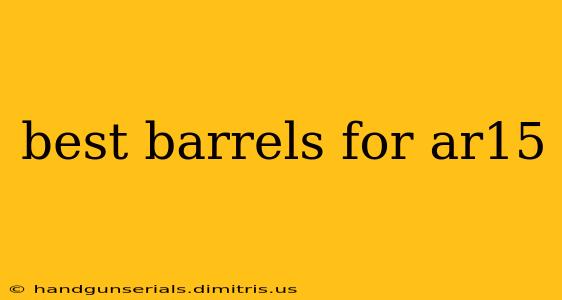Choosing the right barrel for your AR-15 is crucial for accuracy, reliability, and overall performance. This isn't a decision to be taken lightly, as the barrel significantly impacts your rifle's capabilities. This guide delves into the key factors to consider when selecting an AR-15 barrel and highlights some top contenders across various categories. We'll explore different barrel lengths, materials, profiles, and twist rates, empowering you to make an informed choice based on your specific needs and shooting style.
Understanding Key Barrel Specifications
Before diving into specific barrel recommendations, it's essential to understand the key features that differentiate AR-15 barrels:
1. Barrel Length:
Barrel length directly impacts velocity, accuracy, and gas impingement.
-
Shorter Barrels (Under 16"): Offer enhanced maneuverability and reduced weight, ideal for close-quarters combat (CQB) or home defense. However, they typically generate higher recoil and less velocity.
-
Mid-Length Barrels (16"-18"): A popular choice striking a balance between maneuverability, velocity, and recoil management. They offer a good compromise for various shooting applications.
-
Longer Barrels (Over 18"): Maximize velocity and accuracy, often preferred for long-range shooting. However, they increase weight and reduce maneuverability.
2. Barrel Material:
The material significantly affects durability, weight, and cost.
-
Chrome Moly (4140): A common and cost-effective choice, offering a good balance of strength and durability.
-
Stainless Steel (416R): Known for its corrosion resistance and longevity, making it suitable for various environments. It's generally more expensive than chrome moly.
-
Carbon Fiber Wrapped: Offers reduced weight and increased stiffness compared to traditional materials, enhancing accuracy. However, it's typically the most expensive option.
3. Barrel Profile:
The barrel profile affects weight distribution, heat dissipation, and handguard compatibility. Popular profiles include:
-
Government Profile: A classic profile known for its durability and balance.
-
Lightweight Profile: Reduces weight, often preferred for shorter barrels and CQB applications.
-
Mid-Length Profile: Balances weight and stiffness.
-
Heavy Profile: Offers enhanced accuracy and heat dissipation, ideal for sustained firing.
4. Twist Rate:
The twist rate (expressed in inches) refers to how many inches the rifling completes one full rotation. The appropriate twist rate depends on the bullet weight you plan to use. Heavier bullets require faster twist rates for stability.
Top Barrel Manufacturers and Recommendations
Several reputable manufacturers produce high-quality AR-15 barrels. Choosing the "best" barrel depends on your individual needs and budget. Some notable brands include:
-
Ballistic Advantage: Known for offering a wide selection of barrels at various price points, often featuring chrome moly steel.
-
Criterion Barrels: Produces precision barrels known for their accuracy and consistency.
-
Daniel Defense: A reputable manufacturer that produces high-quality barrels, often at a higher price point.
-
Faxon Firearms: Offers a variety of barrels in different materials and profiles.
-
BCM Gunfighter: A respected brand that produces barrels known for their reliability and durability.
(Note: This is not an exhaustive list, and many other excellent manufacturers are available.)
Making Your Choice: Factors to Consider
When selecting an AR-15 barrel, prioritize the following:
-
Intended Use: What will you primarily use your AR-15 for? (e.g., home defense, hunting, target shooting, long-range shooting)
-
Budget: AR-15 barrels range in price from affordable to high-end.
-
Desired Accuracy: If accuracy is paramount, invest in a higher-quality barrel from a reputable manufacturer.
-
Compatibility: Ensure the barrel is compatible with your lower receiver and handguard.
By carefully considering these factors and researching specific barrel options from reputable manufacturers, you can choose the best barrel to optimize your AR-15's performance and meet your individual needs. Remember always to follow safe gun handling practices and consult with a qualified firearms professional if you have any questions.

